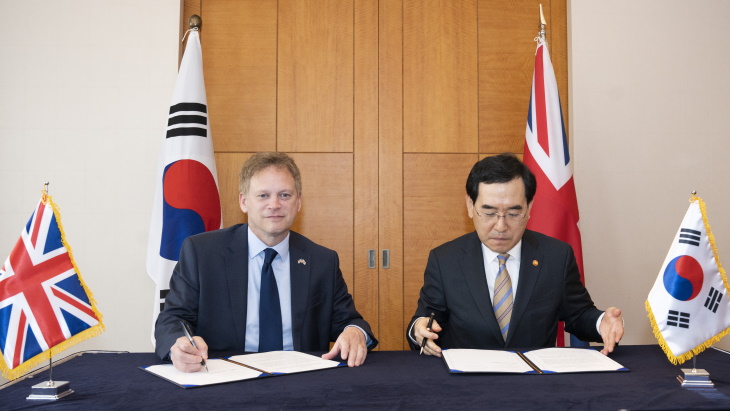South Korea, UK enhance cooperation in nuclear energy
The UK and South Korea have signed a joint declaration stating their agreement on the need for energy transition from fossil fuels to low-carbon power sources, prospects for South Korea's participation in new UK nuclear power plant projects and the two countries' exchanges and cooperation in offshore wind power, hydrogen and other clean energy areas.

Shapps (left) and Lee signing the joint statement (Image: BEIS)
The statement was signed in Seoul on 10 April by British Energy Security Secretary Grant Shapps and South Korean Trade, Industry and Energy Minister Lee Chang-yang.
On nuclear energy, the statement aims "on advancing civil nuclear power generation, cementing a partnership spanning over three decades, covering issues including safety standards and regulation, all agreeing the crucial role of nuclear in creating secure, affordable and clean energy", the UK Department for Business, Energy and Industrial Strategy said.
It said the joint statement of cooperation on energy transition, including civil nuclear energy, focuses on: accelerating plans for civil nuclear - with the UK and South Korea in agreement that nuclear energy has an essential role to play in creating secure and affordable energy; agreement on collaborating to promote the highest standards of nuclear safety, regulation, security, safeguards and non-proliferation – setting a global standard; confirmation of plans to build robust and resilient nuclear supply chains and to share experiences in developing the latest advanced civil nuclear technologies – including small modular reactors; and reaffirming a shared commitment to accelerate the just transition away from unabated coal power and actively collaborate on expanding renewable energy technologies.
"Korea is making a broad range of policy efforts aimed at energy transition in shifting towards carbon neutrality on the basis of stable power supply," Lee said. He added that Korea "plans to expand renewable energy to appropriate and attainable levels while utilising nuclear energy, a zero-carbon power source, on the premise of securing stability."
Lee said "South Korea's strengths lie in design, construction and main equipment production, while the UK's lie in decommissioning and nuclear fuel", adding that "mutually beneficial cooperation is possible".
"I want the Republic of Korea to work ever closer with us in the UK, making the most of world-leading British expertise to move further and faster towards greater use of renewables, of opportunities in the UK to invest, and to redouble our efforts against Putin’s weaponising of our global energy sources," Shapps said.
Last month, Shapps launched the Powering Up Britain policy paper, which sets out "ambitious plans to scale up affordable, clean, homegrown power and build thriving green industries in Britain ... boosting the country's energy security and independence and reducing household bills for the long-term and maintaining a world-leading position in achieving net-zero". On nuclear, the government has launched Great British Nuclear, which will be responsible for driving the delivery of new nuclear projects, with the aim of increasing the share of nuclear in the UK's electricity mix from the current 15% to 25% by 2050.
In July last year, the South Korean government laid out a new energy policy which aims to maintain nuclear's share of the country's energy mix at a minimum of 30% by 2030. It also called for the construction of units 3 and 4 at the Shin Hanul nuclear power plant to resume. The new policy also aimed to strengthen exports of new energy industries and "capitalise on them as growth engines". It sets the goal of exporting 10 nuclear power plants by 2030, as well as the development of a Korean small modular reactor design.
Researched and written by World Nuclear News
- China Institute of Atomic Energy
- Nuclear Power Institute of China
- Southwestern Institute of Physics
- China Nuclear Power Operation Technology Corporation, Ltd.
- China Nuclear Power Engineering Co., Ltd.
- China Institute for Radiation Protection
- Beijing Research Institute of Uranium Geology (BRIUG)
- China Institute of Nuclear Industry Strategy (CINIS)
- China Nuclear Mining Science and Technology Corporation


